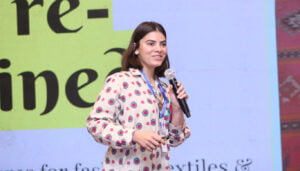Finnish furniture maker thrives in Ethiopia

Furniture produced by the Puustinen family in Ethiopia has been selling strongly. Company trained the local staff with the support from Finnpartnership.
Many good business ideas arise from a need to solve everyday problems. After moving to Ethiopia, the Puustinen family found that local shops had no furniture suitable for their home. Other expatriate residents seemed to be having the same problem so the Puustinens decided to begin making their own. “The furniture sold in Ethiopia is either imported or locally produced to standards and designs that could be much better,” Henrik Puustinen says.
He and his wife Sini established SINI Furniture Interior Design Plc in December 2010. They purchased second-hand woodworking machinery in Finland and sent it by container to Ethiopia. Production got underway in autumn 2011 in an industrial building in the capital Addis Ababa. The start-up was assisted by Finnpartnership, which provided business partnership support for part of the training costs of SINI Furniture employees. The support covered also the wages of Finnish instructors and their travel costs from Finland. The training course for Ethiopian employees dealt with carpentry, upholstery, occupational safety, and so on.
“Our instructors included several Finnish artisan students who did internships with us in Ethiopia,” Henrik Puustinen recalls. At the same time, the company started selling furniture at its own store in the centre of Addis Ababa.
Unexpectedly heavy demand
SINI Furniture designs and produces sofas, armchairs, television stands and kitchen tables and chairs that reflect Nordic design. Customers can also order bespoke sofas or other furnishings to the dimensions and colours of their choice.
“We are gradually learning what kind of furniture sells in Ethiopia, and how to price it.” From the outset the company has used cash flow financing, aided by the local tradition that the customer pays half the price when the order is made and the rest before it is delivered. “In this way there are no credit losses,” Henrik Puustinen says.
The company now has 70-75 employees and three stores in Addis Ababa. Demand for its furniture has been even stronger than expected. Competing firms in Ethiopia sell a lot of massive furniture that is unsuitable for small urban apartments. Young families are an important group of customers for SINI Furniture. “You should see a couple’s expressions when they come into our store and realise that it is, after all, possible to find a corner sofa that fits their home.”
SINI Furniture also sells to foreigners working in Ethiopia, embassies, hotels and restaurants. “We haven’t had much need for marketing because word spreads on the grapevine.” Demand has been boosted by Ethiopia’s brisk rate of economic growth, expected to approach 10 percent in 2015.
Finnfund loan for expansion
In response to strong demand, the Puustinens decided on a large expansion to their production facilities, due to be completed in stages during 2016. “The enlargement will allow us to produce furniture in large batches. Using the new premises and new working practices, we can raise production to 5 or 10 times its present level.”
Henrik Puustinen predicts that, after the expansion, SINI Furniture will employ about 200 people in Ethiopia. Finnfund is financing the increase in production capacity with a loan. “Finance from Finnfund is very important in allowing us to increase production volume and make a great advance in quality,” he says.
Finnfund Senior Investment Manager Ari Nironen points out that finance from Finnfund was a precondition for the project. “The company couldn’t get long-term financing locally and is too small to be able to turn to international sources. Without Finnfund’s loan, production would have had to struggle on for much longer in inadequate temporary facilities,” Nironen says.
Major development impacts
The expansion project has significant development impacts. When production rises, it will create jobs for more than 100 new employees, as well as new opportunities for subcontractors. The project will also boost the skills of current and new employees. “Training courses and the new skills learned will improve their position in the job market and increase their earnings.” In time, Nironen adds, trained employees move to other jobs, which will enhance general carpentry skills in Ethiopia.
SINI Furniture stands out from the local competition because of its stock of machinery, its working practices, occupational safety and environmental and social responsibility. “Its success can act as a beacon to the local carpentry industry and the skills it fosters will be transferred to other companies in the sector,” Nironen continues. Finnfund is having a positive impact on appropriate implementation of the project, and on company operations on a sustainable basis. A major element of this is corporate responsibility for environmental and social matters.
Share on social media


